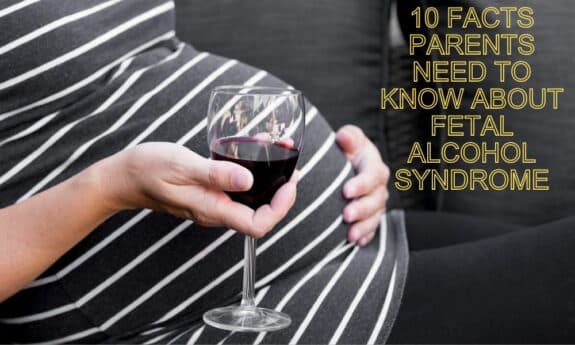Pregnancy is a time of great joy and excitement, but it also comes with great responsibility. What you eat, drink, and do while you’re pregnant can have a profound effect on your unborn baby’s health. Drinking during pregnancy can lead to a serious condition called fetal alcohol syndrome. Sadly, it affects about 1 in 100 babies born each year in the United States.
Every year, the month of September is dedicated to raising awareness about this preventable disorder. This is an important time to educate people about the risks and dangers associated with drinking alcohol during pregnancy. The goal is to prevent prenatal alcohol exposure, which can lead to lifelong physical, behavioral, and intellectual disabilities for the baby. It is important to understand the consequences of alcohol consumption during pregnancy and to spread awareness to mothers, families, and communities about the dangers of Fetal Alcohol Syndrome.
What is Fetal Alcohol Syndrome?
Fetal alcohol syndrome (FAS) is a group of physical and mental birth defects that can occur if a pregnant woman drinks alcohol. FAS is not a curable condition, but it is 100% preventable if a woman does not consume alcohol while pregnant. It’s important to note that there is no safe amount of alcohol that can be consumed during pregnancy. Drinking alcohol during pregnancy can cause various health issues that can easily be passed on to the unborn child.
How Alcohol Affects the Unborn Child?
When a pregnant woman drinks, the alcohol enters the bloodstream and can easily pass through the placenta and travel to the fetus. This increases the baby’s blood alcohol levels, which can lead to a range of physical and mental abnormalities. The unborn baby’s liver, which is still developing, struggles to process the alcohol, leading to damage and cell death.
How much Alcohol Causes Fetal Alcohol Syndrome?
The severity of FAS can vary widely depending on the amount, frequency, and timing of alcohol consumption during pregnancy. Unfortunately, there is no absolute “safe” level of alcohol that can be consumed during pregnancy without risking harm to the fetus. It’s recommended that pregnant women abstain from alcohol entirely to avoid the possibility of FAS.
What are the symptoms of Fetal Alcohol Syndrome?
The symptoms of FAS can vary from mild to severe and can include physical, mental, and behavioral symptoms. The physical symptoms of FAS can include small head size, low body weight, and poor coordination. The mental symptoms of FAS can include developmental delays, learning disabilities, and memory problems. The behavioral symptoms of FAS can include hyperactivity, difficulty with socialization, poor reasoning skills, and poor memory.
How is Fetal Alcohol Syndrome diagnosed?
The diagnosis of FAS is not a straightforward process as there is no single test to determine its presence. Instead, a team of healthcare professionals, including a pediatrician, geneticist, and neurologist, will conduct a comprehensive evaluation of the child’s physical features, cognitive functioning, and other related issues. This thorough assessment helps to confirm that the child meets the diagnostic criteria in place for FAS. A child with FAS often has ‘distinctive facial features, including small eyes, an exceptionally thin upper lip, a short, upturned nose, and a smooth skin surface between the nose and upper lip.’
Can Fetal Alcohol Syndrome be detected before birth?
While the symptoms of FAS may not become apparent until after birth, it is possible to detect the condition before a child is even born. By using specialized medical imaging techniques, doctors can examine the developing fetus for signs of FAS. One such technique, known as fetal MRI, allows doctors to visualize the brain and other organs in great detail, giving them the ability to detect abnormalities associated with FAS.
Is there a reduced life expectancy for individuals born with Fetal Alcohol Syndrome?
FAS can lead to a myriad of health problems, including a reduced life expectancy. This decrease in longevity can be attributed to the damage that alcohol can cause to the developing brain, resulting in cognitive and behavioral impairments that can impact overall quality of life and diminish overall health over time.
Can Fetal Alcohol Syndrome be passed down to future generations?
While research on the subject is ongoing, there is evidence to suggest that FAS can be passed down to future generations. The risk of passing on FAS increases when multiple generations have a history of alcohol use during pregnancy. This is because alcohol can cause changes in DNA, known as epigenetic modifications, that are inherited from both parents. Consequently, children born to mothers who consumed alcohol during pregnancy may also carry a higher risk of FAS. It’s important to note, however, that not all individuals who have been exposed to alcohol in the womb will develop FAS, and that avoiding alcohol during pregnancy is always the safest option.
Can Fetal Alcohol Syndrome be cured?
Sadly, there is no known cure for FAS. However, early diagnosis and treatment can help manage symptoms and improve the quality of life for those affected. Treatment often includes therapy to address developmental and behavioral issues, medication to manage some symptoms, and supportive care
Can Fetal Alcohol Syndrome Cause Autism?
Many studies have shown that alcohol use during pregnancy can lead to a myriad of complications, including stunted growth, cognitive impairments, and physical abnormalities. Autism, on the other hand, is a neurodevelopmental disorder characterized by difficulties with social interaction, communication, and repetitive or restrictive behavior patterns. While there is some overlap in symptoms between these two conditions, the science behind whether FAS can cause autism is still inconclusive.
Fetal alcohol syndrome can lead to countless health issues that can stay with your baby their entire lives. The good news about FAS is that it is entirely preventable; by avoiding alcohol, pregnant women can protect their unborn baby’s health and prevent this serious condition from developing. As a parent, it’s important to take the necessary steps to keep your baby healthy and to avoid alcohol during pregnancy. Remember that the choices you make while pregnant can have a lasting impact on your child’s life, and it is up to you to make the right
ones.
Related Articles:








